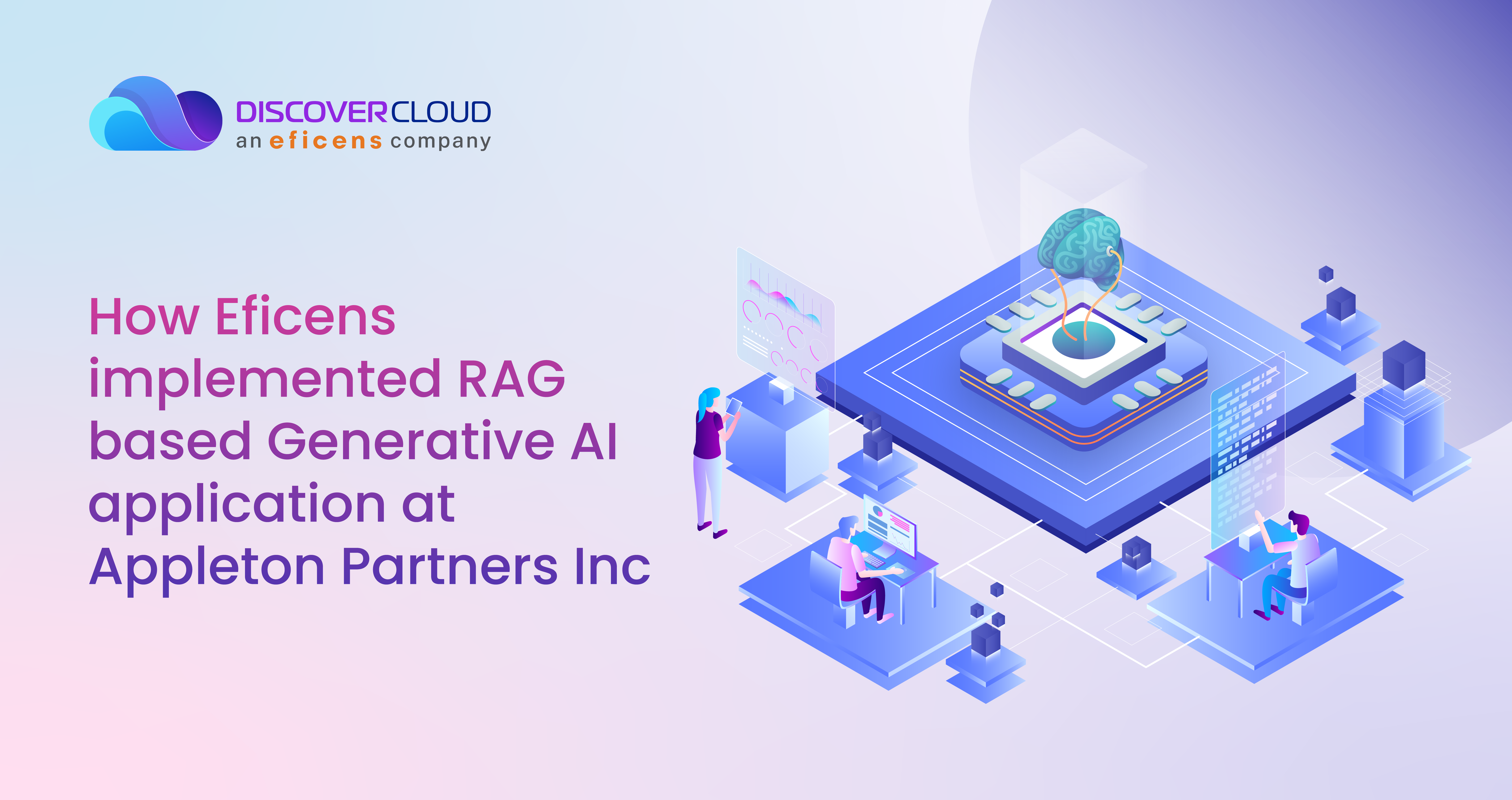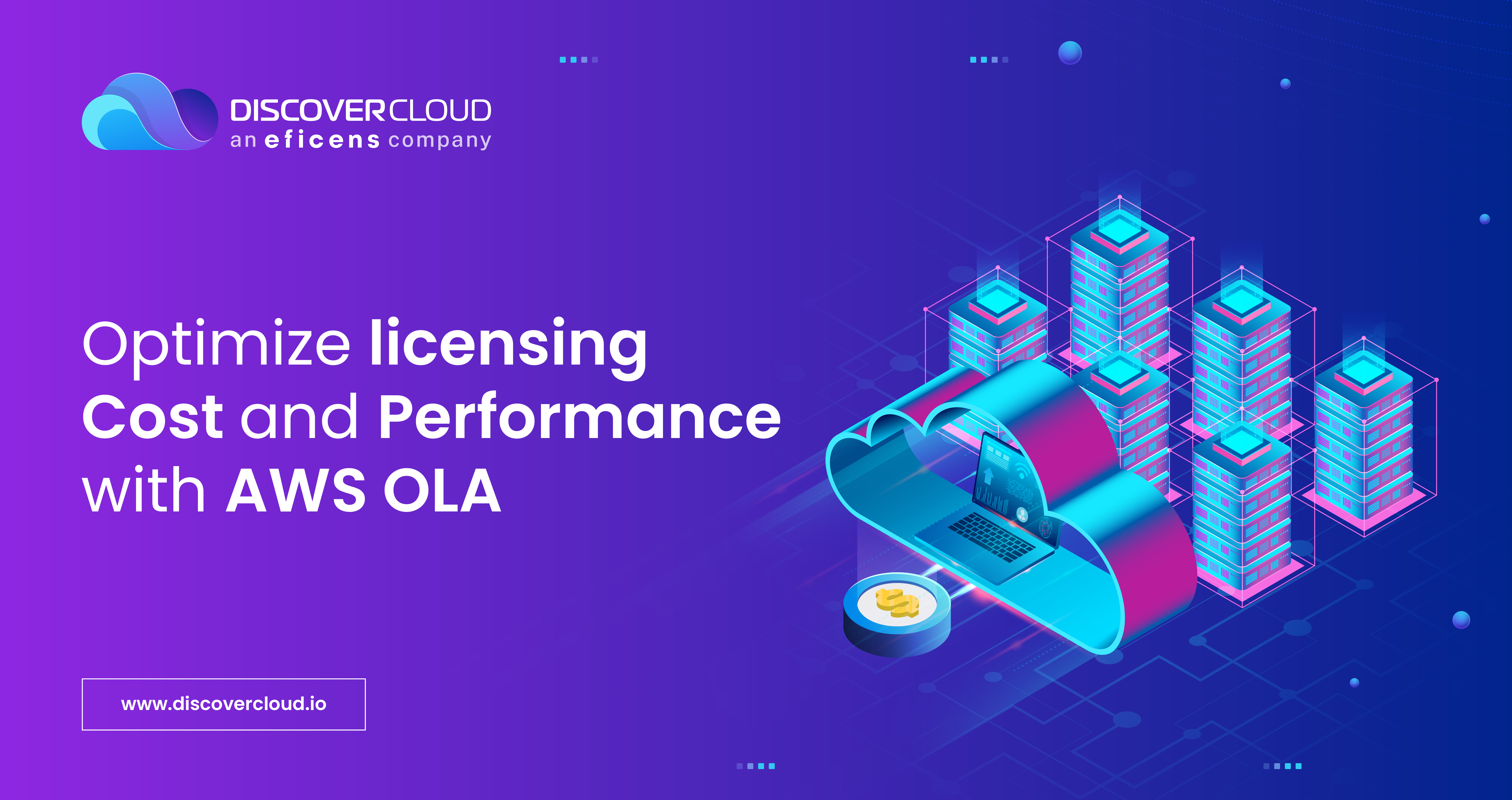Artificial intelligence (AI) and cloud computing—these aren’t just buzzwords anymore! They are here on the frontline, radically transforming how we do business, how we engage with customers, and even how our societies function.
Just consider the numbers- According to an IDC report, we are staring at a whopping $97.9 billion in worldwide spending on AI systems by 2023, a dramatic surge from $37.5 billion in 2019. Meanwhile, Grandview Research reports that the global cloud computing market was valued at USD 483.98 billion in 2022 and continues to grow rapidly.
Now, imagine blending these two technological revolutions. The union of AI and cloud computing is creating a new world filled with new opportunities across all industries. We are talking about the power of AI algorithms analyzing terabytes of data in the cloud to offer valuable insights, help streamline operations, improve customer experiences, and spruce up products and services – all in real-time!
There’s huge potential here, but navigating such transformation isn’t an easy path. It needs a proven strategy and a helping hand – a guiding light to steer clear of pitfalls and press the accelerator on opportunities. Keep reading, because this blog will provide you with just that!
The Growth of AI in The Cloud Age
AI and cloud computing are both growing rapidly these days, and that’s not surprising! Let’s cover the two clear reasons that are driving the growth of AI Cloud technology-
First, tech behemoths such as Microsoft, Amazon, Google, IBM, and Alibaba are offering affordable cloud-based AI services, also called the AI Cloud. These companies provide a range of simplified AI solutions that thrive on the cloud. As a result, businesses and developers can access and implement AI functionality without investing in costly local infrastructure and expertise.
Some examples of AI Cloud are machine learning platforms, natural language processing APIs, computer vision services, speech recognition tools, chatbots, and digital assistants that are offered online by leveraging cloud technology.
The second reason is that various industries like healthcare, finance, and customer service want to use AI for diverse purposes. This is because AI can help improve efficiency and satisfaction in multiple areas through its innovative solutions while cloud technology brings great scalability, efficiency, ubiquity, and profitability.
For example, AI tools that work over the cloud can help automate customer inquiries, analyze customer behavior, diagnose diseases, recommend products, optimize processes, detect fraud, generate content, and enhance user experience.

So, we have a great supply and also great demand for AI in Cloud Services, and that’s the formula for tech success. But another key element is the implementation of AI-powered cloud tools, and that’s where DiscoverCloud comes in with its innovative online accelerators and decades of expertise. More on this later!
The Application of AI to Cloud Services
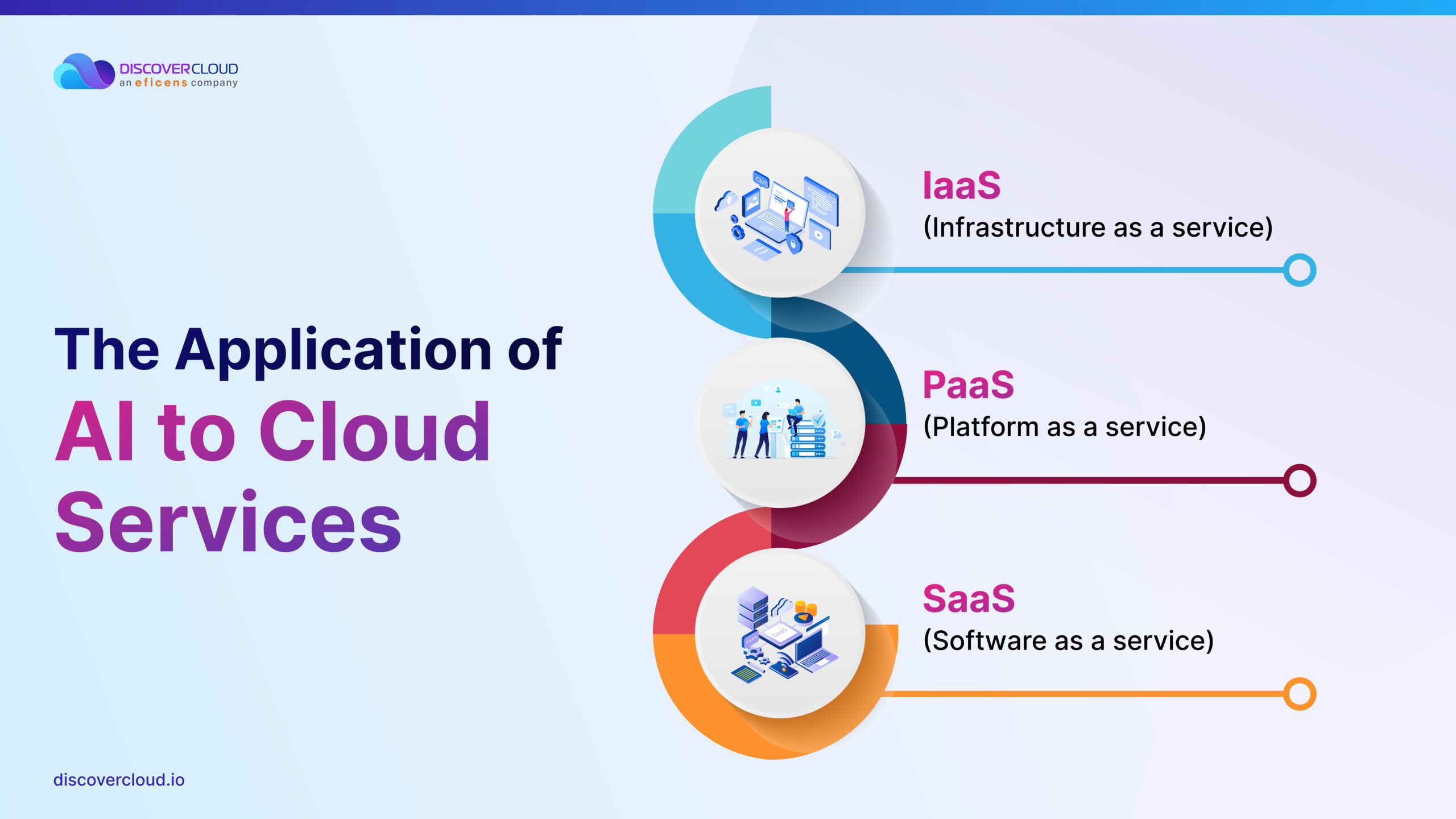
The merger of cloud computing and AI involves the use of cloud-based platforms and services to provide artificial intelligence capabilities. There are three types of cloud computing delivery models in AI:
- IaaS (Infrastructure as a service)- Users rent virtualized computing resources, such as servers, storage, and networks, over the internet. They install and run their own AI software and applications on these resources.
- PaaS (Platform as a service)- In PaaS models, access ready-made platforms and tools for developing and deploying AI applications, without managing the underlying infrastructure. The users can create, test, and run their AI applications in the cloud.
- SaaS (Software as a service)- Users access ready-made AI applications and solutions, without installing or maintaining them on their own devices or servers. This allows them to perform various AI tasks, such as data analysis, image recognition, natural language understanding, and speech synthesis.
With the basics of applying AI over the cloud clarified, let’s look at some of the key applications of AI in Cloud Services:
- AI optimizes how resources in the cloud are used by assessing workload patterns, predicting when the demand will rise or drop, and adjusting resources accordingly. This is helpful for automatically responding to customer inquiries and offers an improved user experience, enhances reliability, and can save costs.
- AI improves security and privacy in the cloud by spotting potential threats and breaches. This includes features like data encryption and anonymization, monitoring user activity, and applying necessary policies to ensure compliance. Such security measures can prevent fraud and offer a safe environment for user interaction.
- AI helps with analyzing data on the cloud, turning large and complex datasets into useful insights and recommendations. The generated content from these data sets can be used by businesses to decipher customer behavior, helping optimize various processes and strategies.
- AI enables intelligent applications on the cloud that create satisfying experiences for customers and users. Digital voice assistants like Alexa and Siri are great examples, of using AI to understand and reply to users’ commands. This form of automation has also found its use in diagnosing diseases in the healthcare sector.
- Cloud-based AI tools like computer vision services, for instance in Azure Face API, help to detect and recognize faces in images or videos. These services are increasingly being used to analyze customer behaviors and recommend more personalized products.
- AI powers online LLMs, like OpenAI’s ChatGPT, to the next level. By learning from massive data sets, AI can generate human-like text that can chat, translate languages, answer questions, and even script an entire article! And it also powers an exploding variety of cloud-based SaaS tools!
- The cloud-powered AI application in healthcare is nothing short of a revolution. From early diagnosis to personalized treatment plans, AI simplifies healthcare like never before. It can efficiently analyze patient records to detect diseases, help devise treatment strategies, and track treatment progress. Teaming AI with cloud computing allows healthcare professionals to access patient data remotely anytime, enhancing patient care services.
While these are some key examples of AI in Cloud Services, the possibilities with cloud-harnessing AI are vast and very potent. Turning these possibilities into a smooth transition and everyday advantage forms the core of what we do at DiscoverCloud. Be it through SAP Assist which simplifies SAP migrations, Traverse which dishes out informative insights on AWS Cloud, or Trekora which smartly manages your cloud costs, we are there for you at every stage of your AI in cloud journey.
The Benefits of AI Use in Cloud Services
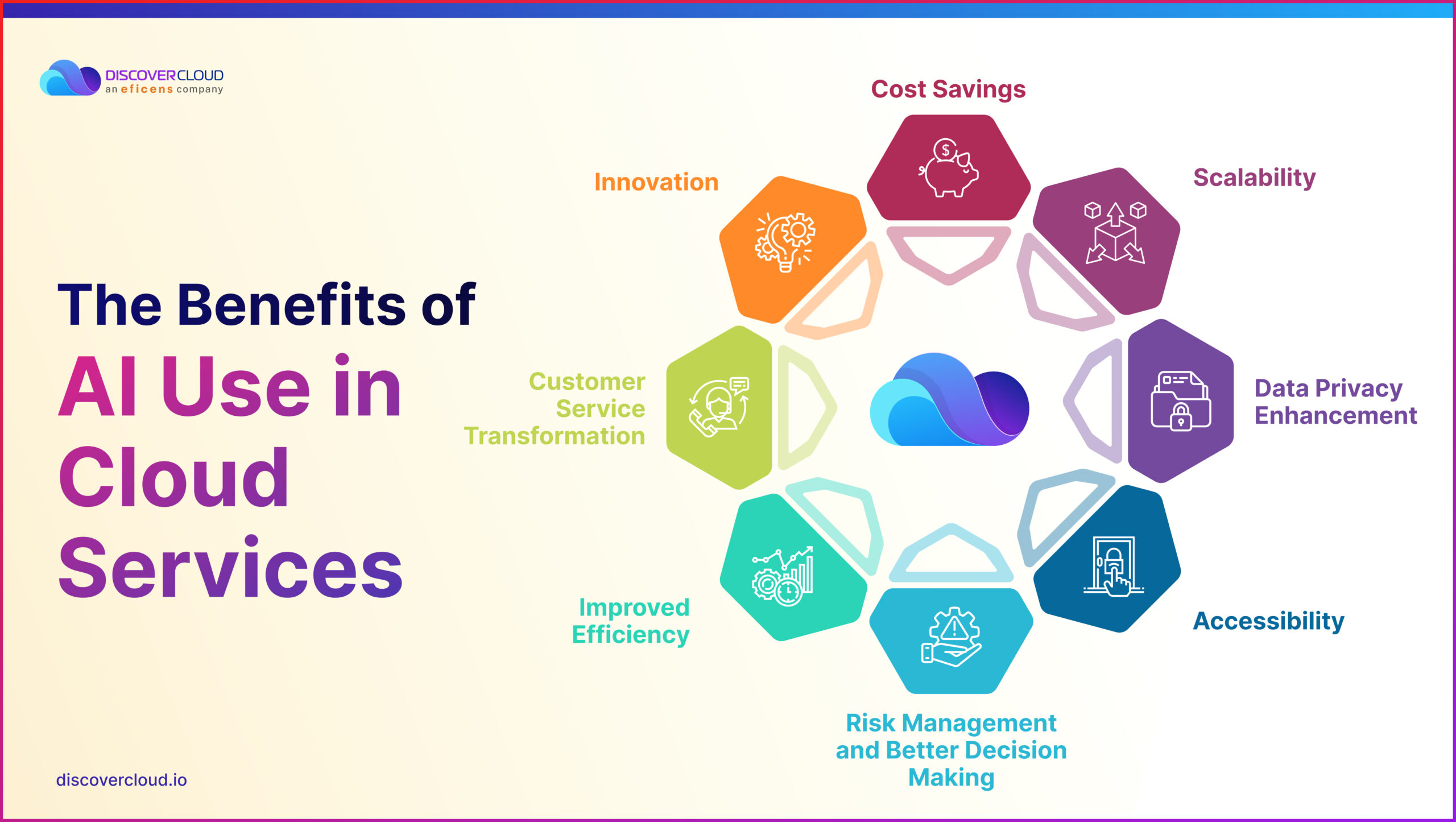
The use of AI in cloud services has many benefits for businesses and society at large. Some of the benefits of the synergy of cloud and AI technologies are:
- Cost savings- Utilizing AI Cloud services allows businesses to save on expenses related to setting up and maintaining their own AI systems and recruiting specialized experts. Plus, with a pay-as-you-go model, they only pay for the services they need.
- Scalability- One of the great advantages of cloud-based AI is its ability to adapt to the fluctuating requirements and demands of users. These cloud services can manage vast quantities of data and intricate computations while maintaining optimal speed and quality.
- Innovation- The use of cloud-based AI encourages businesses to explore new concepts and find unique solutions without the fear of wasting time or money. Companies can also benefit from cutting-edge AI advancements made by leading tech organizations.
- Accessibility- Cloud-based AI services play a critical role in making AI technology more accessible and inclusive to all. They remove obstacles for smaller businesses and individuals interested in using AI to achieve their goals. Moreover, these services provide users with more control over their data and privacy.
- Improved Efficiency- The blend of AI with cloud services has bestowed businesses with the power to perform tasks more swiftly and accurately. AI algorithms can analyze and respond to data with unparalleled speed, significantly reducing manual labor and precious time. It’s like having your very own efficient digital workforce that never sleeps!
- Risk Management and Better Decision Making- By feeding historical data into the AI, businesses can predict and alert about future occurrences, allowing them to prepare in advance. This preemptive outlook toward business operations can minimize risks and place companies ahead in the race.
- Customer Service Transformation- With AI-powered chatbots hosted on the cloud, customers now have 24/7 access to reliable instant support. Leaving customers happier and businesses scaling new highs in customer satisfaction. This round-the-clock service completely reinvents the wheel of customer interaction dynamics thanks to AI in Cloud Services.
- Data Privacy Enhancement- As the wave of digitization sweeps over, the fear of data breaches looms large. But with AI’s intelligence built into your cloud services, you have a powerful shield protecting your data privacy. AI algorithms can bolster security measures, detecting unusual patterns and thwarting cyber threats even before they strike.
The Flip Side
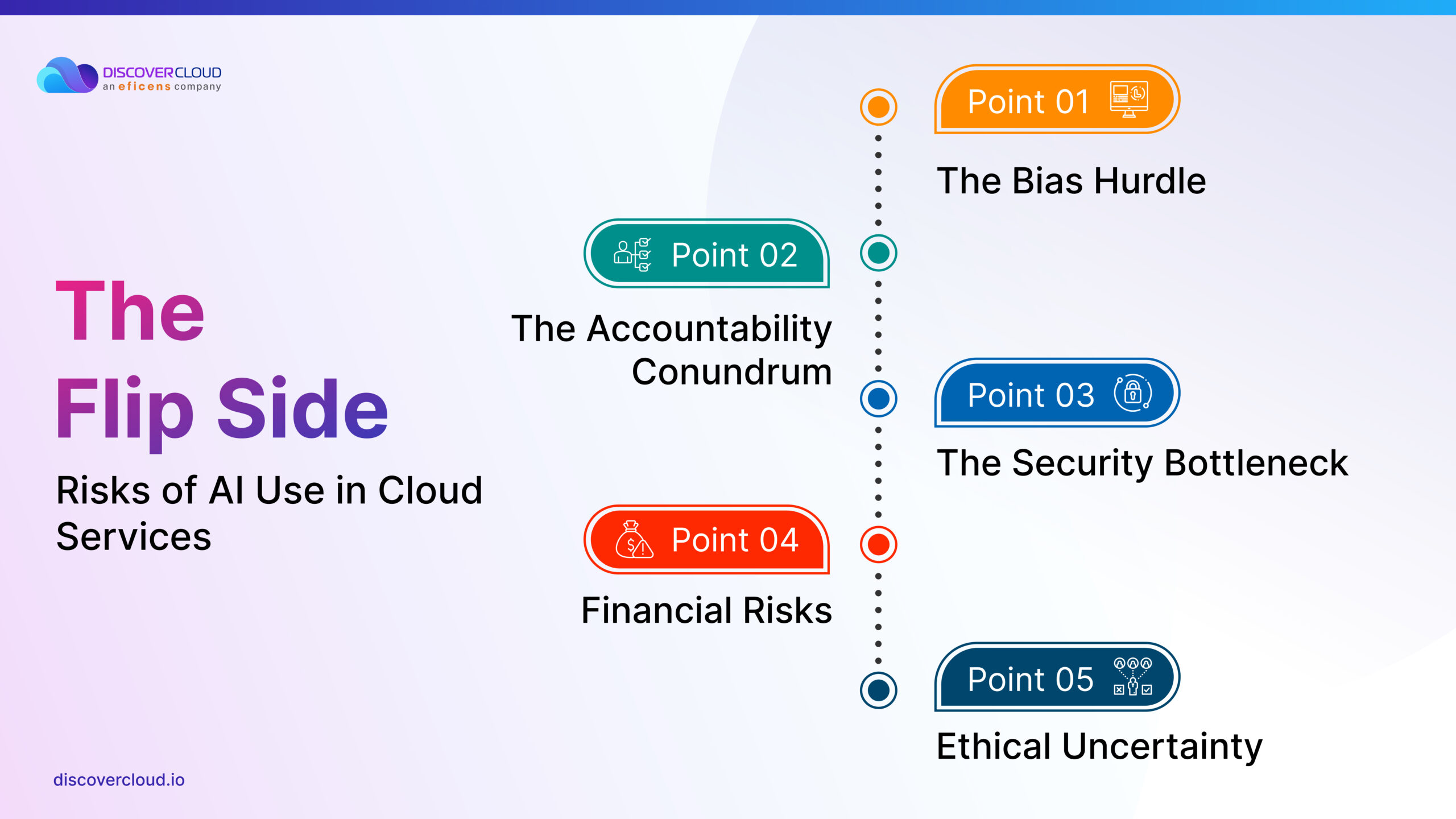
Embracing Artificial Intelligence (AI) in cloud services undoubtedly brings remarkable opportunities to the table. However, some key challenges need addressing. Here’s a rundown of a few hurdles that users often face in their AI journey:
- The Bias Hurdle- No matter how intelligent an AI system is, it may still exhibit bias or discrimination drawn from the data it was trained on or the algorithms it employs. This bias can manifest by unintentionally skewing outcomes against certain groups or individuals. Imagine an AI system determining credit scores, inadvertently assigning lower scores to women or minority groups based on historical data patterns.
- The Accountability Conundrum- Pinpointing responsibility for decisions and actions made by an AI system in a cloud environment can be a hard nut to crack. This challenge brings forth ethical and legal questions surrounding transparency, explainability, trustworthiness, and governance. Who takes the fall if an AI system inadvertently causes harm or damage to a user or a third party?
- The Security Bottleneck- The susceptibility of AI systems to cyberattacks and malicious manipulation poses significant security risks. Such breaches can jeopardize the integrity, confidentiality, and availability of data as well as the services. Think of an AI system hacked to extract classified information or manipulated to modify its behavior or output!
- Financial Risks- The use of AI in cloud services may affect the revenue streams, cost structures, and competitive advantages of businesses. It may create new opportunities but also unseen challenges. Businesses need to consider how to invest in AI, how to measure its return on investment, how to price their services, how to protect their intellectual property, and how to deal with regulatory and tax issues.
- Ethical Uncertainty- Using AI in cloud services may affect the values, norms, and rights of individuals and communities in unforeseen waysBusinesses need to consider how to ensure that their AI systems are aligned with human values, justice, and inclusion.
At DiscoverCloud, we understand the intricacies of navigating the AI-powered cloud landscape, and our experts and accelerators specialize in dealing with these and many more challenges. With us by your side, you will be much better equipped to tackle these challenges fearlessly and unleash your business’s full potential.
How to Find and Select the Right AI-powered Cloud Services for your Company?
Zeroing in on the perfect AI Cloud services that align seamlessly with your company’s unique attributes involves considering several elements. These could include anything from defining your organizational goals to outlining your financial plan, capabilities, and preferences. Here’s how you can strategize effectively:
- Spotlight on the Issue or Opportunity- Begin by pinpointing the exact issues or opportunities you aim to address or leverage using AI. Maybe you’re looking to reinvent your customer service or streamline operations? Or perhaps you aim to refine product offerings or generate insightful analytics?
- Survey Your Options- Once you are clear about your objectives, explore the myriad of AI-powered cloud services that could potentially solve your problem or capitalize on your opportunity. Are you in need of a chatbot or digital assistant, or do you require an API or a framework? Maybe a no-code or a low-code offering fits the bill? Compare the features, advantages, costs, and constraints of each contender.
- Provider Evaluation- Next, scrutinize the reputation, track record, and experience of the cloud service providers you’re considering. Read through customer reviews and case studies, and check out their partners, certifications, and accolades. Don’t forget to consider their security, privacy, compliance, and technological support practices.
- Test the Waters- Before you finalize your choice, take the shortlisted AI-powered cloud services for a spin. Leverage free trials or demos, request proofs of concept or even run pilots. Evaluate the performance, user-friendliness, reliability, and scalability of each option.
- Seize the Best Fit- Now comes the rewarding part! Choose the AI-powered cloud service that aligns best with your problem or opportunity, your budgetary constraints, capabilities, and preferences. Opt for a solution that promises value for money, ease of use and integration, adaptability, and customization – aligning perfectly with your organizational goals.
But it doesn’t end there! You must then work with the tool or service to prepare your data and code, then train and evaluate your AI models, and then deploy and integrate the solution followed by testing and iteration.
Sounds complicated? The process of integrating AI in Cloud Services is indeed complex unless you have the expertise, but here’s where a competent AI-powered cloud services and data strategy provider like DiscoverCloud steps in!
Why DiscoverCloud?
DiscoverCloud’s experts and unique AI-powered accelerators that are available on its free DiscoverCloud online cloud-based portal can be quite the game changer for you! How? Allow us to illuminate these essential accelerators, and what they mean for your business:
- SAPAssist– A tailor-made accelerator that simplifies SAP migrations like never before. We craft meticulous migration plans empowered by AI insights, aligning with both SAP and AWS best practices to ensure a strategic and seamless cloud transition.
- Traverse- Your go-to workload discovery and visualization tool, dedicated to the AWS Cloud. Traverse creates dynamic blueprints of your app’s infrastructure, blending custom elements for utmost clarity. Effortlessly locate resources with its robust search features, and leverage the power of visual collaboration with draw.io integration.
- Trekora- Ready to scrutinize and optimize your cloud expenditure? Trekora is your dependable cloud cost optimizer that offers real-time insights and cost-saving recommendations. This tool takes FinOps to the next level by examining commercial, architectural, and operational aspects to enhance pricing and efficiency—ultimately refining your cloud journey.
Ready to step into the future bravely? Come and let the cloud take your business to new heights with DiscoverCloud’s accelerators and team of seasoned experts who will help you make the most of them.
Summing up
The growing role of AI in cloud services is a phenomenon that has many advantages and challenges for businesses and society. By using cloud-based AI services, you can access and implement AI functionality without investing in costly cloud infrastructure and expertise. However, you also need to address issues related to AI in Cloud Services such as bias, accountability, security, financial impact, and ethical implications.
This is where selecting the right AI-enabled cloud services can be instrumental. So, remember to follow the tips we discussed to make the right choice and leverage the combined power of AI and cloud computing to surpass your competitors!

